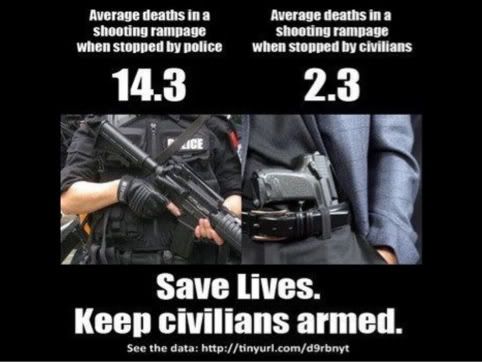I do want to touch on something you said within the post, however, as I think you are a bit misguided:
First off, laws and regulations make crimes (by definition) so it isn't out of the realistic for more regulated societies to have higher rates of crime, because the laws themselves make some acts criminal. If you don't understand what I mean... let's think about those two rooms you mentioned.Stricter gun laws will not slow down criminals at all. It will cripple the good, law abiding citizens, allowing the criminals to get away with anything. You can look at the statistics... Countries that have strict gun laws have rampant crime. Countries where the majority of the citizens are armed have record low crime rates.
Room 1 has no laws. Everything goes. 6 people form a gang, beat the other 14 folks and take their shoes. There are no laws to state that illegal, however. There is therefore, no reportable crime.
Room 2 is governed with laws. It is considered a crime to assault someone. One guy punches a second and is charged with a crime.
You could say that the more regulated room has more crime... but that is only because there were laws to state what constitutes a crime. (This has nothing to do with what you or I would consider a crime, but rather what is reportable in that society)
The above is just a mental exercise. It is a huge exaggeration simply to illustrate a point.
More importantly though (and where I think you are really off base) is that crime rate is a terrible measure for comparing countries, partially because of what I said above. Crime rate is only useful when comparing a single country year-over year. What is considered a crime in one country may not be a crime in another.
Take for example two men who want to kill someone. One lives in the States, buys his gun legally and kills someone. The second lives in Japan and has to buy his gun on the street. The American has one crime: murder. the Japanese has four. In Japan it is illegal to have a gun, illegal to have a bullet, illegal to pull the trigger, and illegal to kill someone, and all are considered separate crimes. It would be incorrect to say that crime in Japan is 4 times that of the U.S. (even though the crime rate may state that).
The way that you should compare countries is by isolating crime which is governed by similar laws. Homicide, assault, burglary... and then look at how they match up. I would also suggest that similar standards of living be considered, as it removes more uncertainties.
If you isolate for specific crimes per capita, I suspect your argument would go out the window. Not because I think the data would necessarily go against what you said, but meaning that it wouldn't support you. Crime has more to do with people than it does anything else.
There will be exceptions for both sides of the argument, but my point is simply that I don't believe a trend can be established. I don't believe more guns equals less crime, nor do I believe that less guns equals less crime. I do, however, suspect the States will be higher in most counts of isolated crime when compared to its peers.
We can delve into it further if you like.

